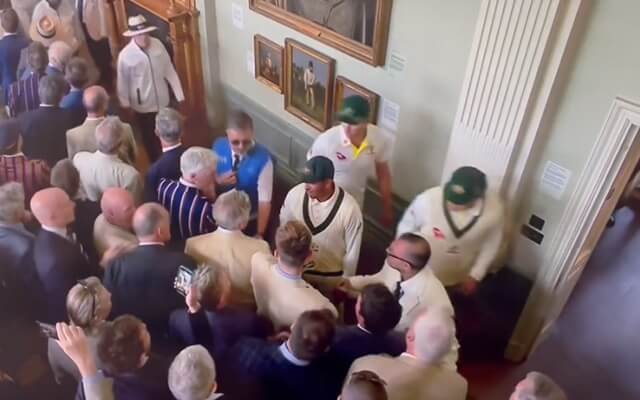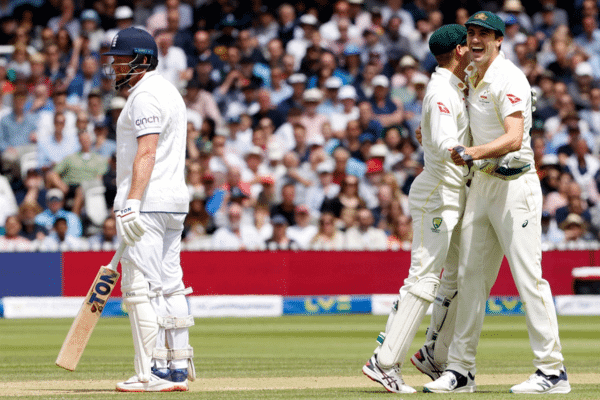Of all the peculiarities of the game of cricket, the most amorphous and unique remains the elusive “Spirit of Cricket”. It’s the veritable Schrödinger’s cat of the game: whether it exists often depends squarely on your own biases. So often does the Spirit of Cricket lock horns with the “Laws of the Game” that many find themselves suddenly wondering why those laws exist at all. And as Australian and English players and fans have learned over the last week, the enduring power struggle between the Spirit of Cricket and the laws of cricket can very quickly develop into a full-scale diplomatic row.
The latest furore erupted on the final day of the second Ashes Test at Lord’s, after England’s Jonny Bairstow, believing the ball to be “dead” at the end of an over, wandered mindlessly out of his crease. Bairstow was promptly stumped by Australia’s wicketkeeper Alex Carey, his dismissal confirmed by the umpires.
The reaction was unprecedented. The typically mild-mannered Lord’s crowd turned immediately feral; the unflinchingly parochial English scribes launched headline-seeking salvos at the post-match press conference; and as was inevitable, fans on social media clashed with hypocrisy and misguided whataboutisms. Even days after the match, the leaders of both nations were forced to issue statements in support of their national teams, with Rishi Sunak – like his electors – crowing about the importance of the Spirit of Cricket, and Anthony Albanese evoking a key primary school cricket lesson: stay in your crease.
All of which brings us to the biggest irony of the events that transpired at Lord’s in the second Test, but also the most disgraceful aspect – being the conduct of those privileged few who watch the game from the fabled Lord’s Member’s Pavilion: the members of the Marylebone Cricket Club (MCC).

The MCC boasts one of the most closely-guarded and exclusive sporting memberships of all time, with a wait time of nearly 29 years and a relatively small pool of current members. The 236-year-old club also anoints itself as the “guardian of the Laws of the Game”, a typically MCC-esque descriptor of the club’s role in determining changes and updates to the rules of cricket.
The MCC has, over the years, sought to modernise laws from time to time, including recently clarifying that a run-out at the non-striker’s end (a mode of dismissal colloquially but injudiciously referred to as the Mankad) is perfectly legal, and not considered “unfair” or against the Spirit of Cricket. Yet when the laws of the game were applied against England at Lord’s, some MCC members seemed to temporarily forget that they are privileged members of the very organisation which wrote those laws.
Many within the MCC will continue to refer to cricket as the “gentlemen’s game”, an almost archaic designation that paints a quaint picture at odds with the unyielding and highly professional modern game. It’s also at odds with the conduct displayed by some MCC members, who resorted to hurling vitriolic abuse at the Australian team in the Lord’s Long Room, typically a place for polite and fair applause.

It’s also not to be ignored that Pakistani-born Usman Khawaja – widely regarded as one of the most amiable, level-headed players in world cricket – was seemingly singled out for abuse by members of the predominantly white, upper-class MCC. While there were no allegations of racism by either Khawaja or Cricket Australia, one can’t help but second-guess the motivation for targeting a player whose only indiscretion this English summer has been to torment the English bowlers with his bat.
The MCC’s Laws of the Game describes the Spirit of Cricket as, amongst other things, respecting the opposition and the authority of the umpires, accepting the umpire’s decision, creating a positive atmosphere by your conduct and encouraging others to do likewise, congratulating the opposition on their successes, and showing self-discipline even when things go against you.
All of which were wantonly disregarded not only by those MCC members who took it upon themselves to unleash a torrent of aggression towards the Australian cricket team, but through its thus-far lacklustre response, the MCC itself.
If there was a clear violation of the Spirit of Cricket at Lord’s, it was not by the Australian cricket team, but by those who claim to guard the Spirit of Cricket most closely. The Marylebone Cricket Club would do well to abandon its pretence as “Guardian” of the game; there is no utility in having the fox guard the hen house.
Read More: World Test Championship: India stumbles at the final hurdle – again





